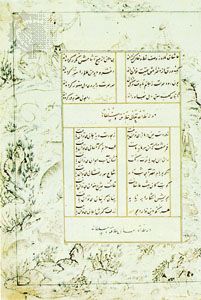divan
divan, in Islamic societies, a “register,” or logbook, and later a “finance department,” “government bureau,” or “administration.” The first divan appeared under the caliph ʿUmar I (634–644) as a pensions list, recording free Arab warriors entitled to a share of the spoils of war. Out of rents and property taxes exacted from conquered farmers and landowners, hereditary pensions were assigned to warriors entered in the divan. Later the term came to signify a financial institution, and, by the time of the caliphate of Muʿāwiyah (661–680), it meant a government bureau, e.g., the chancellery or the postal service. In Arabic literature, the term is used to refer to a collection of poetry.
Iranians used the term divan until about the 19th century to mean the central government in general, while in Mughal India, from the time of Akbar (1556–1605), the term was chiefly associated with government finance, the chief finance minister being the divan, with provincial dawāwīn under him. In the Ottoman Empire the divan became the imperial chancery headed by the grand vizier, though a consultative assembly of senior officials summoned by Selim I in 1515 was also called a divan. The term was early extended to mean the audience chamber of important government officers, whose offices, furnished with mattresses and cushions along the walls, account for the extension of the meaning of divan to sofa. The English East India Company, during its period of administration in India, called its revenue administration “dewanee.” In modern Turkey a divan is an administrative unit in rural areas.










